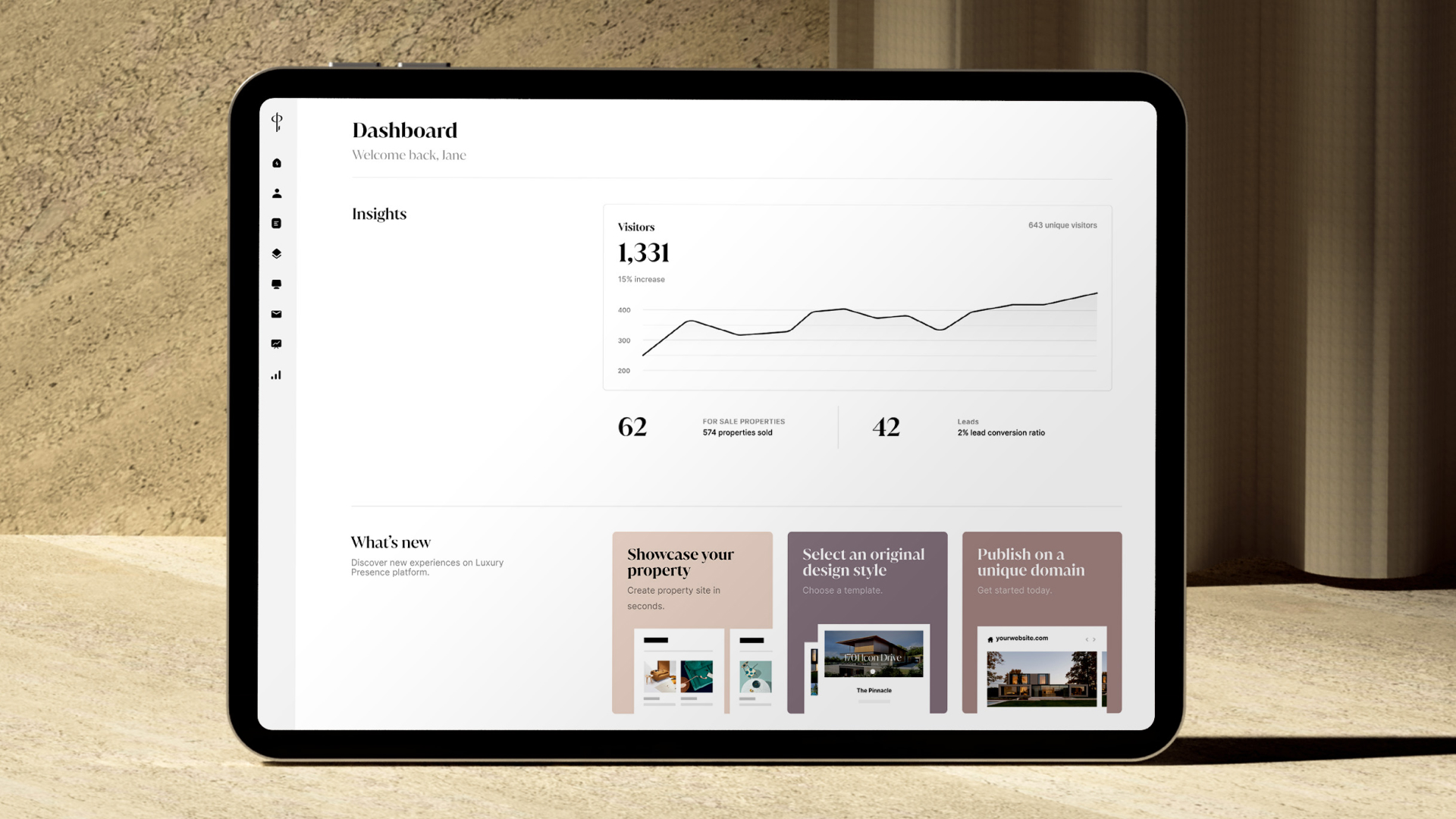The phrase “forced registration lead capture” might sound intense, but it’s as simple as this: a tactic that requires a visitor to your website to enter a few personal details in exchange for getting access to the information they want. And for real estate professionals who want to succeed at lead generation, it can be critical for success.
There are a lot of misconceptions about forced registration lead capture. You might think, for example, that you don’t need to use this method because many of the giant real estate sites don’t. But the reason sites like Zillow and Realtor.com can use more passive lead capture methods instead (like requiring registration when someone favorites a property, or using sharing links to follow and retarget potential leads until they sign up) is because they have massive reach and are in a position to wait it out. This can be hard to compete with for even the most successful local agent or brokerage, which is why forced registration lead capture is so important to help you stay competitive.
So, is forced registration lead capture right for your business? Read on for a look at its pros, cons, and alternatives.
Find It Fast
The pros of forced registration lead capture

Forced registration lead capture can help you generate higher-quality leads, collect better data, tailor your marketing, and get better results. Let’s dig into these benefits in more detail:
Higher-quality leads
By requiring potential leads to fill out their information, you’re effectively creating a screening process that discourages casual browsers and filters out those unwilling to invest time and effort into the registration process. Anyone who takes the time to fill out a registration form has already shown a willingness to engage with a real estate agent or company (which happens to be you!). This demonstrates a higher level of interest in buying or selling a property. The information you collect can help you identify leads’ readiness and need, which allows you to prioritize clients with serious intent.
Better data collection
You can collect a lot of information through forced registration lead capture, including:
- Basic personal information, including name, email address, and phone number
- Property preferences, including location, property type (single-family home, condo, townhouse, etc.), budget range, and number of bedrooms and bathrooms
- Other relevant information, including current homeownership status, a timeline for buying or selling, financing preferences, and preferred communication method
More targeted marketing
With this information provided by potential clients, you open up a ton of possibilities to refine and tailor your marketing, including:
- Personalized content: You can tailor email campaigns based on property preferences and budget, and then send hyper-relevant listings and market updates to prospective clients.
- Segmentation and targeting: You can group leads based on similar characteristics or preferences, and develop marketing campaigns that specifically address their needs.
- Improved follow-up strategies: You can use leads’ preferred communication methods to increase engagement and response rates, and prioritize leads based on their timeline and readiness to buy or sell.
- Enhanced client relationships: You can use the collected information to better understand clients’ needs, and build trust and rapport through personalized and attentive service.
Better results
Because you’re dealing with higher-quality, more serious leads, and can target them with personalized marketing, there’s a ton of upside. This includes:
- Increased engagement: Relevant and personalized content captures leads’ attention, leading to higher open and click-through rates in email campaigns.
- Efficient resource allocation: Targeting the most promising prospects (those who have greater potential for conversion) helps you maximize your return on investment.
- Improved lead nurturing: Tailored marketing messages add value by addressing leads’ specific needs and concerns of leads, building trust, and moving leads through the sales funnel.
- Higher conversion rates: Targeted marketing efforts resonate with serious clients, increasing the likelihood of transactions, and more effective follow-ups and interactions lead to more closed deals.
- Enhanced brand reputation: Personalized and relevant marketing efforts demonstrate professionalism and understanding of client’s needs, and these positive experiences encourage clients to stay loyal and refer others.
The cons of forced registration lead capture
Of course, there are some potential downsides to forcing leads to register, such as:
Negative user experience
Being forced to register can be an annoying or frustrating experience for some users, who may view the process as aggressive or intrusive. This may lead to some customers getting a negative impression or questioning your priorities and intentions. However, as forced registration lead capture grows in popularity, this may become less of a concern.
Privacy concerns
Privacy is top of mind for many consumers in the digital age, and some may be hesitant to provide personal information, fearing data privacy issues, potential spam, or unwanted marketing communications. One smart way to handle this is by being very clear and upfront about your privacy policy, how you protect their data, what they are signing up for, and how you will and will not use their information.
The potential for reduced traffic
Some visitors may view mandatory registration as too large a hurdle and be discouraged from exploring your website further. If they bounce from your site immediately, you may lose the opportunity to engage them in other ways, and they may seek out competitors who don’t require registration. This can negatively impact your search engine optimization (SEO), leading to fewer visitors, which might mean less brand exposure and fewer potential leads.
It’s important to remember that many people who may be deterred are casual leads, rather than those with serious interest. Still, you never know who might later become a client, so it’s something to consider.
Alternatives to forced registration lead capture

If you’re still feeling a bit hesitant about registration lead capture, despite its many benefits, there are other routes you can take, including soft registration methods and content marketing strategies.
Soft registration methods include:
- Voluntary registration forms: This tactic encourages users to provide information willingly, but doesn’t require it to access content. This can increase your likelihood of obtaining accurate and useful data from interested leads.
- Progressive profiling: This is a method of gradually collecting lead information over time as visitors interact with your website. It can reduce friction and improve the user experience while still allowing you to gather valuable data.
- Call-to-action prompts: This involves strategically placing CTAs throughout your website, enticing users to provide information in exchange for additional services or benefits.
- Social media integration: You can also consider leveraging social media sign-in to make registration quick and easy for visitors, increasing the chance that they complete it.
There are a lot of benefits to using one of these softer approaches, including:
- An improved user experience: A less intrusive approach increases the likelihood of users engaging with and exploring your website.
- Higher website traffic: By minimizing barriers to entry, you encourage more users to visit and browse your site, contributing to better search engine rankings and visibility.
- Enhanced brand reputation: Respecting users’ preferences and privacy builds trust and credibility, and this positive perception increases the chances of referrals and recommendations.
- Greater lead diversity: These methods allow you to capture casual and serious leads, broadening the prospect pool and providing opportunities to nurture casual leads into serious clients over time.
- Flexibility in lead generation: Various data collection methods allow you to test and optimize your lead capture strategies based on user behavior and preferences.
Another alternative to forced registration is attracting and engaging potential clients through content marketing strategies. With quality content, you can:
- Showcase your expertise: Sharing well-researched articles, market insights, and advice demonstrates industry knowledge, building trust and credibility with potential clients.
- Address client pain points: Creating content that offers solutions to common challenges faced by homebuyers and sellers positions you as a valuable resource and problem-solver.
- Appeal to potential clients visually: High-quality images and virtual property tours entice users to explore listings, and attractive website design and engaging multimedia content encourage longer site visits.
- Connect with your local community: Providing neighborhood guides and local market trends demonstrates your understanding of the local market and commitment to the community.
- Create shareable content: Crafting informative and engaging content that users are likely to share on social media expands your brand reach and attracts new potential clients.
Generate more leads with Luxury Presence

Like every sales and marketing process, forced registration lead capture has its pros and cons. It’s important to consider them carefully and make the right decision for your business. Whether you choose this powerful tactic or a softer approach, there are many smart ways to level up your lead generation, including partnering with experts.
To learn more about how Luxury Presence can help you showcase your brand, save time, and attract and convert more leads, explore our platform and marketing solutions or schedule a free demo with our team.




